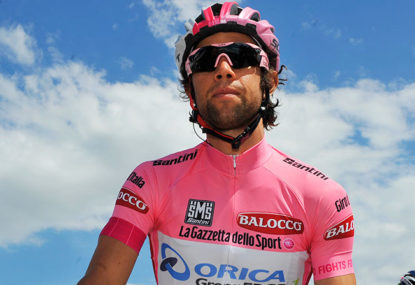'I've just won a stage of the Tour de France, mate!': Hindley grabs yellow jersey as Aussie blows Tour apart
Australia's Jai Hindley has said he is "lost for words" after a shock stage victory at the Tour de France earned him the leader's…

We are just five stages into the 2014 Giro d’Italia (not counting last night’s stage) and already, in true Grand Tour fashion, the race has thrown up its fair share of winners and losers.
On the positive side, Australians Cadel Evans and Michael Matthews have benefited most from the Giro so far, while Marcel Kittel, Dan Martin and Ryder Hesjedal have been the ones to suffer.
Evans, leading BMC in a Grand Tour for perhaps the final time, is the best placed of the GC contenders as we near the end of the first week. Capitalising on his team’s solid opening team time trial performance, Evans has managed to avoid crashes and keep out of trouble as he awaits the lumpier terrain later in the race that bests suits him.
He looks well supported and comfortable as he surfs along in the peloton each day and his little dig for second place on the uphill finish at the end of Stage Five gained him a valuable time bonus, one that is sure to count when things get tight as we delve deeper into this intriguing Giro.
At the end of Stage Five he sat in third place overall, just 15 seconds behind countryman Michael Matthews, who is having a glorious Giro.
The 23-year-old Matthews slipped into the maglia rosa at the conclusion of Stage Two and hasn’t relinquished it yet. He inherited the jersey from teammate Svien Tuft, and has fought proudly to keep the coveted fabric in the Orica-GreenEDGE family.
Nowhere was that more evident than at the conclusion of Stage Five. Matthews managed to stay with the peloton over the long, medium mountain stage, but was gapped within the final kilometre as the race climbed to its end.
Digging deep, the young sprinter managed to drag himself (and a wheel-sucking group of others) back to the leaders. The effort cost him the chance to compete in the sprint to the finish, with noted climbers such as Evans and Rigoberto Uran (Omega Pharma-Quick Step), but the gutsy Aussie still managed to finish sixth, conceding only a second to eventual winner Diego Ullisi (Lampre) to keep the maglia rosa firmly on his back.
His three-plus days in the leader’s jersey of what is only his second Grand Tour nicely complements the two stage wins he picked up in his first (last year’s Vuelta a Espana).
But bike racing is a sinister beast. For every winner there is a loser. For every inspirational victory or performance, there is a heart-wrenching loss.
This year’s tear jerker came early and cost not just one rider a chance at victory, but two.
Dan Martin, exhilarated that the Giro was visiting his home shores and equally as determined to give his Irish fans something extra to cheer for, crashed out of the race in the opening kilometres of Stage One.
Riding in the middle of Garmin-Sharp’s pace line during the team time trial, Martin’s wheels slipped out from under him as he shot across a manhole cover. He landed heavily and slid across the wet tarmac, taking down the riders behind him including previous Grand Tour winner Ryder Hesjedal.
Martin injured his collarbone and could take no further part in the race, while Hesjedal and his remaining teammates lost minutes in their race against the clock. The sight of four of their fit riders pedalling circles on the roadside as they waited for a previously dropped rider to catch up and give them the five-rider minimum was hard to watch.
It was not the start that Garmin had hoped for.
But it is not always the crashes that curtail the best laid plans of the Giro’s participants.
Marcel Kittel (Giant-Shimano) proved beyond doubt he was the best sprinter in the race. Victories on the first two road stages confirmed his standing as one of the best in the business. On Stage Two he left the others’ heads bobbing in his wake, while in Stage Three he seemed to come from the distant horizon to pip Sky’s Ben Swift by half a wheel on the line.
The win against Swift left him gasping for breath and he lay on the roadside for what seemed like an eternity afterwards, trying somehow to find the energy needed to once again rise to his feet.
Unfortunately, they would be the last images we would see of the big German.
His physical condition deteriorated during the rest day that followed and a feverish and exhausted Kittel had to withdraw from the race before the start of Stage Four. He had fallen victim to the poor Irish weather and fatigue.
Inclement weather is something that the Giro is well acquainted with and once again it had exerted its unwelcome influence. Even when the race returned to Italian shores, the rain persisted, albeit without the wintry blast that accompanied it in the Emerald Isle.
But this time, coupled with southern Italian roads that had been dry for several weeks beforehand, the tarmac became little more than a skating rink. “Like riding on glass,” stated Nicolas Roche (Tinkoff-Saxo), and the peloton agreed.
Stage Four into Bari was reduced to a procession, with riders refusing to race. When the pace did pick up for the final sprint, riders were sent tumbling across the roadway with eventual winner Nacer Bouhanni (FDJ) lucky to avoid taking a spill on the final corner.
It was just another obstacle placed in the way of those chasing victory, highlighting that even the most accomplished of riders needs an ounce of luck if they are to prevail in such a brutal, hard fought race as the Giro.
And the best thing is, that for us, the spectators, the race has only just begun!